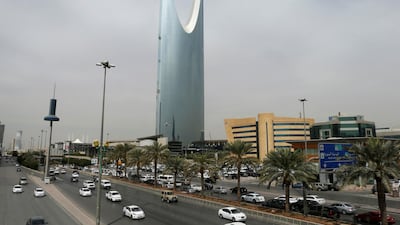Saudi Arabia on Friday announced 120 billion riyals (Dh117.3bn) worth of initiatives to mitigate the impact of the coronavirus outbreak on its economy and to support small and medium enterprises.
The latest announcement includes the 50bn riyals announced earlier this week to help SMEs.
"The government of the kingdom of Saudi Arabia is moving decisively to address the unprecedented effects and consequences of the coronavirus global pandemic crisis, and is taking immediate measures to ensure the safety of its citizens and residents, and to address its fiscal, financial and economic impact," Saudi Arabia's Minister of Finance and acting minister of economy and planning, Mohammed Al Jadaan, said.
The financial stimulus package of these initiatives amounts to more than 70bn riyals, which consists of exemptions and postponement of some government dues to provide liquidity to the private sector so they can manage to continue operations. In addition, the Saudi Arabian Monetary Authority has announced a package of 50bn riyals to support the banking sector, financial institutions and SMEs.
The initiatives include exemption from expatriate levy for those whose Iqama, or residence permit, has expired from now until June 30. Permits have been extended for a period of three months without charge. The exemption enables employers to refund the fees of issued work visas that were not used during the ban on entry and exit, even if they were stamped in the passport, or extend them for a period of three months without charge.
State measures also include postponing collection of customs duties on imports for a period of 30 days against the submission of a bank guarantee.
The government will also be deferring the payment of some government service and municipal fees due from private sector for a period of three months. These include delaying payment of value-added tax, excise tax, income tax and the submission of Zakat declarations.
Mr Al Jadaan emphasised that due to the financial strength of the economy and efficiencies and improvements achieved, the government has considerable ability to diversify sources of financing between public debt and government reserves to adequately tackle the emerging challenges.
"This allows positive intervention in the economy in the right way and at the right time, while limiting the impact on the government's goals in maintaining fiscal sustainability and economic development in the medium and long term," he said.
The Saudi government also issued directives to form a number of ministerial committees to study the impact and repercussions of the coronavirus crisis and its challenges on sectors or regions. They will study the prospect and means of tackling such a crisis through subsidies or stimulus packages or other forms.
The committees include energy, trade, tourism, entertainment and sports committee, industry and mineral resources committee and logistic services committee.
The Central Bank of the UAE also announced a Dh100bn economic plan and Egypt unveiled a 100bn pound (Dh23.3bn) plan to mitigate the virus's impact on banks, the private sector and wider economy.

